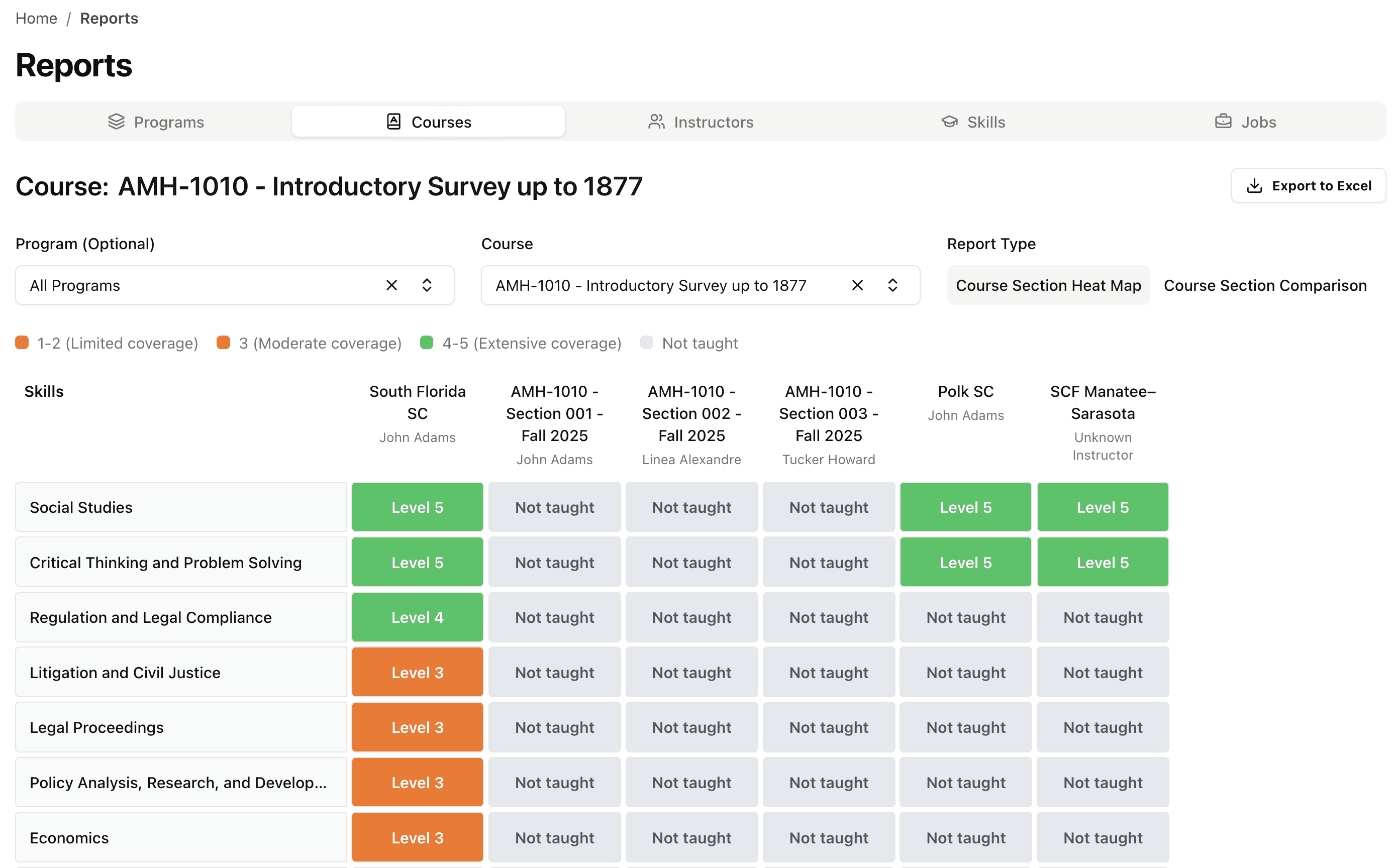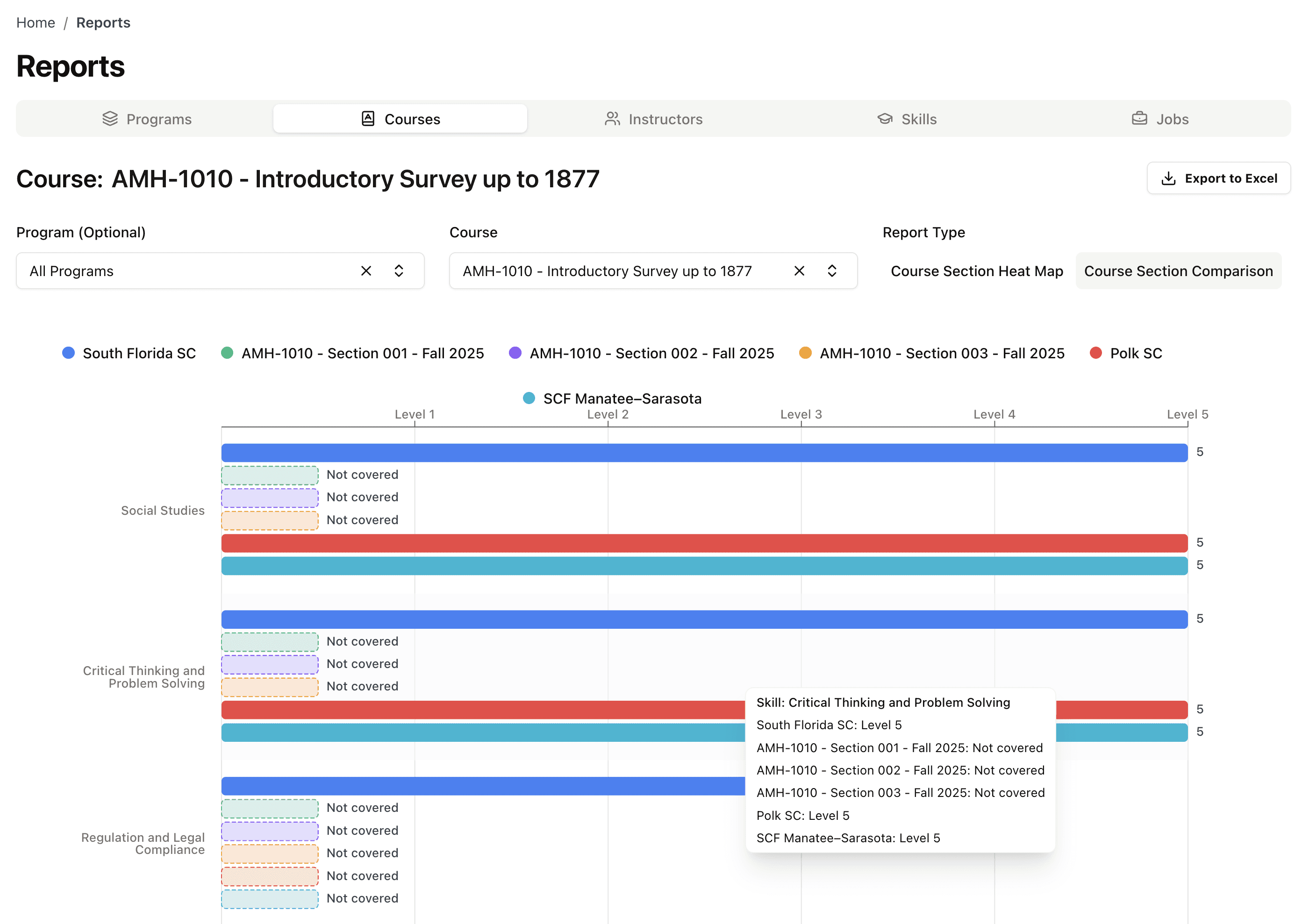Tuesday, January 14, 2025
Course Skills Analysis

Course Level Skills Analysis
Easily see how any course—or individual section—delivers in-demand skills. The Course Skills Analysis tool empowers academic leaders to pinpoint gaps, ensure consistency across sections, and align learning outcomes with workforce needs.
Step 1 — Select the Courses tab
Browse your institution's full course library or search for a specific offering. You can explore everything from general education to specialized workforce programs.

Step 2 — Filter by Program or Course
By Program: Focus on the courses within a specific academic pathway to see skill coverage across the full curriculum.
By Course: Drill into a single course (or section) to understand exactly what skills are being taught—and to what depth.

Step 3 — Choose a View: Heatmap or Bar Graph
Heatmap: See color-coded skill coverage across all sections—instantly revealing where skills are not taught, partially covered, or extensively taught (Levels 4–5).
Bar Graph: Compare skill proficiency side-by-side by section or institution to quickly identify leaders and laggards.


Why this matters for decision-makers
With Course Skills Analysis, you can:
- Ensure alignment with employer needs by confirming skills taught map directly to job market demands.
- Identify inconsistencies in how skills are taught across campuses, sections, or instructors.
- Drive program improvement using data-backed insights instead of anecdotal feedback.
Example Use Cases:
- A provost compares multiple sections of Introductory Survey up to 1877 and spots one section with no coverage of "Critical Thinking and Problem Solving," prompting targeted faculty development.
- A dean uses the bar graph to benchmark skill coverage in "Regulation and Legal Compliance" across campuses, ensuring uniform learning outcomes before accreditation review.
Ensure Outcomes, Boost Credibility, and Drive Enrollment
Mapademics' Course Skills Analysis equips academic leaders—provosts, deans, curriculum designers, and institutional researchers—with actionable insights to demonstrate alignment between your courses and high-demand workforce skills.
Close the skills gap proactively
Instantly identify where key competencies—like critical thinking, legal compliance, or social studies—are underrepresented. Then, assign faculty support or redesign curriculum sections to address those gaps before it impacts accreditation or student outcomes.
Streamline accreditation and reporting
Eliminate labor-intensive audits by generating evidence-rich skills coverage graphics across course sections. Whether for internal reviews or external accreditor submission, you'll have data-ready dashboards at your fingertips.
Tell your outcomes story to students and employers
Promote your institution's career-readiness: "Our AMH-1010 sections uniformly teach critical thinking and social studies at the highest level" resonates with career advisors, recruiters, and prospective students seeking real-world preparedness.
Uncover inconsistencies and normalize excellence
Spot disparities in instructional delivery between instructors or campuses, and act with focused professional development—ensuring equitable and consistent student experience across your institution.
Designed for Higher-Ed Decision-Makers
This tool empowers:
- Provosts and academic office leaders aligning all courses with institutional learning goals and workforce competencies.
- Curriculum administrators and accreditation specialists who need to produce robust evidence—quickly and visually.
- Faculty champions eager to validate their instructional design and gain peer benchmarks or share best practices.
- Career services and enrollment teams who want to highlight how classroom learning prepares students for actual careers.
Ready to dive in?
Connect with our friendly team to learn more about how Mapademics can help your institution.